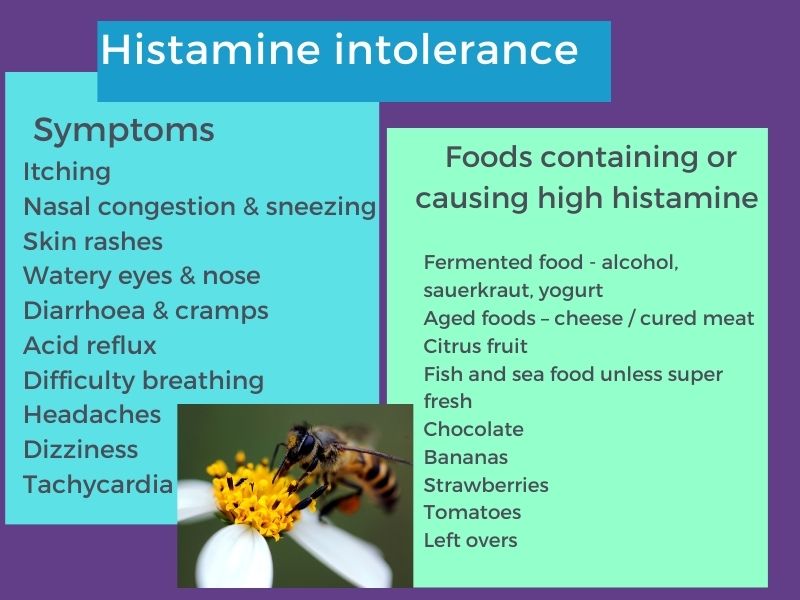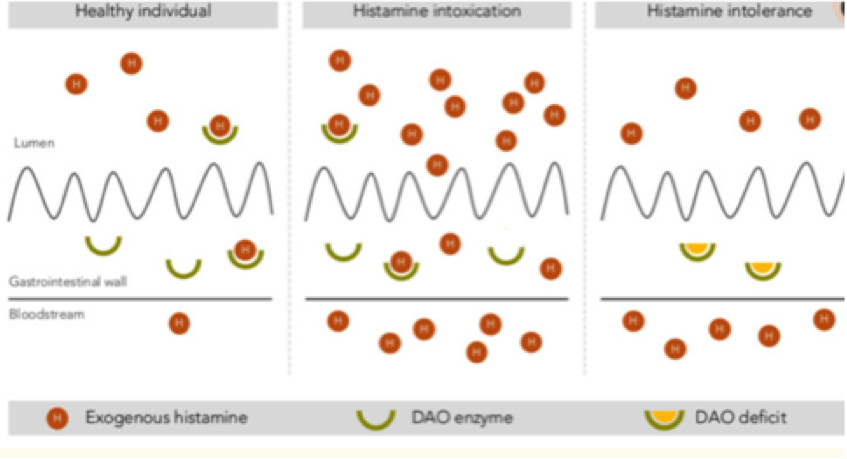
Histamine is an important immune molecule which certain foods trigger the immune system to release. As part of our immune response to bacteria, viruses or other pathogenic microorganisms it increases vascular permeability. This allows white blood cells and proteins access to pathogens through mechanisms such as runny eyes or nose, sneezing, coughing and itching, diarrhoea and cramps, acid reflux and also headaches.
Histamines are also found in certain foods especially those which are aged, cured or fermented such as cheese, sauerkraut and cured meats.
Some people have difficulty degrading histamine in order to eliminate it from the body often due to a deficiency in the main enzyme responsible known as diamine oxidase (DAO). If the balance between histamine accumulation and degradation is upset then histamine intolerance can result. People seem to have different levels of tolerance for the amount of histamine accumulating in the body which can be due to a number of issues including: genetic predisposition; gut dysbiosis; damage to the gut lining; medications; chronic inflammation; gender; ageing; autoimmune diseases; pulmonary diseases and heavy metal toxicity. It is possible to test for genetic single-nucleotide polymorphisms (SNPs) to the DAO encoding gene and more than 50 SNPs have been identified.
Symptoms are multifaceted and diverse due to the distribution of histamine receptors throughout the body. Research shows that the most frequent are gastrointestinal including: abdominal distension; postprandial fullness; diarrhoea; abdominal pain and constipation. Nervous and cardiovascular impairments include dizziness, headaches and palpitations. Respiratory and dermatological symptoms were also common. Researchers estimate incidence at 1-3% of the population but it is frequently unrecognised as symptoms can mimic other common issues such as respiratory problems, food allergy or intolerance as well as general gut issues, vertigo and even arrhythmias. Random reactions to food can be a key indicator. One day a glass of wine and some cheese is fine but the next day it causes a strong gut reaction. This can be due to the level of histamine that has accumulated in your body.
Other signs that you may be histamine intolerant are:

Comas-Baste, O. (2020), Histamine intolerance: The current state of the art; Biomolecules 10(8); 1181.
If required this will ideally be a temporary measure whilst root causes are addressed. Commonly these include gut health especially issues with the small and large intestine such as SIBO and mycotoxin /mould issues. It can also be related to the microbiome as some gut bacteria are histamine producers.
Even if there is an underlying genetic issue reducing our histamine intake can give the body time to recover and heal. Genetic expression is not static genes are like Christmas tree lights they turn on and off all the time according to your environment. When we restore our gut lining to a healthy state this supports the body to produce the enzymes necessary to degrade and eliminate excess histamine.
Certain nutrients are required for histamine metabolism such as vitamin B6, vitamin C and copper. Supplementation can be helpful although particular care must be taken with pre and probiotics to avoid promoting histamine producing strains.
This is a complicated area. A low histamine diet can be difficult to implement on your own and is quite restrictive. If you would like help with this or to discuss working with me on any other issue please take advantage of my free discovery call 07740 876233. We may need to work on gut dysbiosis, gut permeability, microbiome diversity or reducing toxic load and improving liver function amongst other areas.




